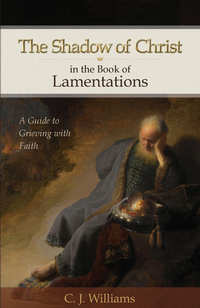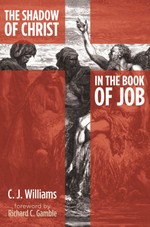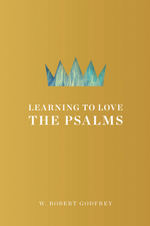by W. Robert Godfrey
eARC, 263 pg.
Reformation Trust Publishing, 2017
Read: April 2 – 16, 2017

Godfrey’s Afterword begins:
In our study, we have made a beginning of learning to love the Psalms. We have looked at some of the attractions and difficulties of the Psalter. We have summarized the great themes, subjects, and emotions of these songs. We have examined some of the forms and uses of the Psalms. But this book is at best an introduction and invitation to growing in an appreciation of the Psalter. You need to carry on with what we have started together.
That right there is a great 80 word summary of the book — both in intention and execution. If that summary appeals to you, you’ll dig the book.
Godfrey starts with a few short chapters talking about the Psalter as a whole. He discusses his own personal history with the Psalms and what attracted him to them and the benefit he’s gained — then a very quick look at Psalms in Church History (notably their impact on the Reformation). Then he discusses why people are discouraged from getting into them, how to overcome that, how to approach the Psalms and some basic things to think about why studying them/using them for yourself. He gives 10 questions to use when coming to any Psalm that are easy enough for any rookie to put to use and also for any one who had studied the Bible for years to benefit from.
Following that he looks at each of the 5 collections or books or whatever you want to call the groupings of the Psalms that make up the whole Psalter. These would be:
BOOK ONE – THE KING’S CONFIDENCE IN GOD’S CARE: Psalms 1– 41
BOOK TWO – THE KING’S COMMITMENT TO GOD’S KINGDOM: Psalms 42– 72
BOOK THREE – THE KING’S CRISIS OVER GOD’S PROMISES: Psalms 73– 89
BOOK FOUR – THE KING’S COMFORT IN GOD’S FAITHFULNESS: Psalms 90– 106
BOOK FIVE – THE KING’S CELEBRATION OF GOD’S SALVATION: Psalms 107– 150
THE CONCLUSION OF THE PSALTER: Psalms 146– 150
In these parts, Godfrey explores the structure and themes of each and then looks at at least 5 psalms in that book — opening them up for the reader, seeing how they work together with the other around them, in some cases how they don’t fit the theme of the rest of the book. All of these are brief, but thorough, chapters (an overview chapter and then individual chapters on each Psalm) — insightful and helpful on their own — much more so when combined with the other chapters in that section or the book as a whole. But really, if you wanted help with, say, Psalm 78 (to choose at random) as a refresher for something — the chapter on that from this book would be a great way to start. Godfrey explains:
The intention of this study is not to provide an exhaustive exegesis of each psalm considered, but rather to open a way to a growing understanding of the Psalms. God gave His people the Psalter so that we could more and more be defined by it, so that we could find our identity in it. We as the people of God today need to learn for ourselves what it means to live in the Psalms. In a real sense, they give us words to express what it means to live as a Christian. We should live in and out of the Psalms.
“They give us words to express what it means to live as a Christian ” I love that line — as I have really started to explore the Psalms for myself over the last couple of years, that’s really what I’ve been seeing and will immediately start using that phrase to describe it.
These sections of the book are the heart of it — as helpful as the initial chapters are. It’s not a commentary, as he states, but it does do a great job of jump-starting your individual study. I probably jotted down more quotations from these sections than I have from others lately, and the temptation to list them all is great. I’m going to limit myself to three, just so you can get a taste of Godfrey’s language and the variety of topics/themes he addresses:
The difference between this praise song [based on Psalm 103] and the actual psalm [103] is striking. The song is repetitive in vague terms: He has done great things. The psalm, by contrast, is specific about the various blessings received. Taking the psalms as our standard of praise should warn us against the repetitiveness of many contemporary songs and lead us to praise that is much more pointed and specific. Genuine gratitude reviews in detail the wonderful gifts of our God.
— Both a pointed critique and a challenge/encouragement for how to go express our gratitude biblically.
From Psalm 73:
Pictures that reconstruct the temple almost invariably misrepresent the scene as very clean and tidy. In fact, the altar must have been a rather horrible sight of blood and charred remains. It was surrounded with the odors of blood, burnt flesh, and death. Flies probably swarmed around. What the psalmist saw was what God intended His worshipers to see: that the wages of sin is death in all its horror. The altar testified that sin leads to destruction, and the only way to avoid the just consequences of sin is to find a substitute and sacrifice. The altar testified that the blood of a spotless substitute was necessary for sin to be forgiven. . .The altar and the sacrifices point to Jesus and His saving work. He is the true sacrifice and substitute for His people.
From his discussion of Psalm 74:
Here is a concern often repeated in the Psalter: Why does the Lord not act more promptly in response to the needs and prayers of His people? Why? First, we should notice that this questioning by the psalmist stands against the advice offered today by some well-meaning Christians who say that we should never ask why. Such advisers voice a kind of Christian stoicism, teaching that we must just grin and bear it. The psalmist, by contrast, gives strong expression to the depths of his emotions. Indeed, God, by the example of the psalmist, encourages His people to a refreshing honesty in prayer, including honesty in expressing our emotions. Fear, anger, frustration—all are emotions that we find poured out in the Psalter. But we must remember that they are emotions expressed by a believer who still trusts his God. It is immediately after these questions that the psalmist asserts his faith in the words of verse 12.
Again, I could keep going, but I’m going to force myself to stop. But we have here gratitude, sacrifice, mercy, despair, fear, faith and that’s just in 3 Psalms — only bits of his explorations of 3 Psalms, actually. Godfrey’s guide to the Psalter touches on almost as many aspects of the Christian life as the Psalter itself does.
I should note that this one of those books whose end-of-chapter discussion questions are actually worth reading and using. It’s such a rarity, that it needs to be pointed out when you do see it.
I’m not going to say that this is a flawless work, there are a few places where my notes consist primarily of question marks or “that seems like a stretch.” But most of those are on comments about the structure of the Psalter as a whole, about the organization of the “books” of the psalms and that sort of thing — which isn’t to say I disagreed with anything he said there, it’s just that he didn’t convince me. But given my lack of study on this sort of thing, it’s very possible I just need to think about it all some more. Mostly my notes are along the lines of “excellent,” “great point,” or “why didn’t I have this book years ago to help me with topic/discussion X?”
Earlier, I quoted from the Afterword, which could’ve been longer (most of the book could’ve been longer, really — but it would’ve become imposing, intimidating and less attractive for its target audience if it had) but was a great way to sum up the book and spur the reader on for further study, reflection and devotion in the Psalms. It served as a good call to action with some very handy tips.
Now, I must admit I didn’t read this one the way I should’ve — it would’ve taken me a couple of months to do so and I really figure that Reformation Trust wanted something a bit more timely than that from a NetGalley offering. This is the kind of book to read with a Bible and notebook within reach and to use both of them frequently. It’s a book that takes study and time to get everything out of — and I fully intended to return to this book soon for just that purpose — which isn’t to say that it’s not approachable or that it’s difficult to read. Not at all, this is one of the least technical books I’ve read in a long time when it comes to Bible Study. There’s nothing here stopping anyone from profiting from the book. But to get everything out of the volume, you need to put in the time to read what Godfrey says and reflect on it while reading (or singing) the Psalms discussed and working through them on your own.
All in all, this is a very helpful book — a good study, a good aid for individual/group use (I think it’d be great for family worship/devotions/whatever you call it), and an encouragement to dig into one of the more intimidating yet wonderful books of the Bible in order to find those “words to express what it means to live as a Christian”. I heartily recommend this book.
Disclaimer: I received this eARC from Reformation Trust Publishing via NetGalley in exchange for this post — thanks to both for this, I benefited from this greatly.
N.B.: As this was an ARC, any quotations above may be changed in the published work — I will endeavor to verify them as soon as possible.
—–

 The Shadow of Christ in the Book of Lamentations:
The Shadow of Christ in the Book of Lamentations:

![]()






